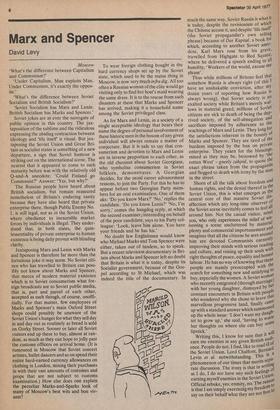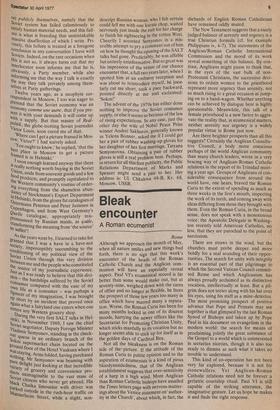Marx and Spencer
David Levy
Moscow 'What's the difference between Capitalism and Communism?'
'Under Capitalism, Man exploits Man. Under Communism, it's exactly the opposite.'
'What's the difference between Soviet Socialism and British Socialism?'
'Soviet Socialism has Marx and Lenin. British Socialism has Marks and Spencer.'
Soviet jokes are as ever the surrogate of public opinion in this country. The juxtaposition of the sublime and the ridiculous expressing the abiding contraction between ideology and 'life itself' is visual. But juxtaposing the Soviet Union and Great Britain as socialist states is something of a new departure, a sign that Soviel humour is striking out on the international scene. The nearest that it appeared to come to such maturity before was with the relatively old Q-and-A anecdote: 'Could Finland go Communist?' Answer: 'Yes, but why?'
The Russian people have heard about British socialism, but remain reassured nonetheless of Britain's enduring sanity because they have also heard that private enterprise there, though Public Enemy No. 1, is still legal, not as in the Soviet Union, where obedience to inexorable market forces by individuals is illegal. They understand that, in both states, the quintessentiality of private enterprise to human existence is being daily proven with blinding clarity.
Juxtaposing Marx and Lenin with Marks and Spencer is therefore far more than the fortuitous joke it may seem. No Soviet citizen who has travelled to Britain can possibly not know about Marks and Spencer, that mecca of modern material existence which is to Soviet consumerism what foreign broadcasts are to Soviet public media, that is, part and parcel of each other, accepted as such though, of course, unoffi-. cially. For that matter, few employees of Marks and Spencer's main Oxford Street shops could possibly be unaware of the Soviet Union's hunger for what they sell day in and day out as routinely as bread is sold on Gorky Street. Sooner or later all Soviet visitors end up there to buy, almost at random, as much as they can hope to jolly past the customs officers on arrival home. (It is rumoured in Moscow that Soviet concert artistes, ballet dancers and so on spend their entire hard-earned currency allowances on clothing in London, mixing their purchases in with their vast amounts of costumes and props that are not subject to customs examination.) How else does one explain the pecurliar Marks-and-Sparks look of many of Moscow's best wits and bon vivants? To wear foreign clothing bought in the hard currency shops set up by the Soviet state, which used to be the status thing in Moscow, is now very much infra dig. All too often a Russian woman of the elite would go visiting only to find her host's maid wearing the same dress. It is to the rescue from such disasters at these that Marks and Spencer has arrived, making it a household name among the Soviet privileged class.
As for Marx and Lenin, in a society of a single acceptable ideology that bears their name the degree of personal involvement of these historic men in the bosom of any given individual will always remain a matter of conjecture. But it is safe to say that consumerism and devotion to Marx and Lenin are in inverse proportion to each other, as the old chestnut about Soviet Georgians, who symbolise consumerism in Soviet folklore, demonstrates. A Georgian decides, for the usual career advancement reasons, to join the Party. For this he has to appear before two Georgian Party members for an oral examination. One of them aks: 'Do you know Marx?' No,' replies the candidate. 'Do you know Lenin?"No, I'm sorry,' comes the hangdog reply, at which the second examiner, interceding on behalf of the poor candidate, says to his Party colleague: 'Look, leave him alone. You have your friends and he has his.'
No doubt few Englishmen would know who Michael Marks and Tom Spencer were either, taken out of tandem, so to speak. But a recent television documentary in Britain about Marks and Spencer left no doubt that Britain is what it is today, despite its Socialist government, because of the Gospel according to St Michael, which was indeed the title of the documentary. In
much the same way, Soviet Russia is what it is today, despite the revisionism of which the Chinese accuse it, and despite 'life itself (the Soviet propagandist's own telling phrase) because of Das Kapital, a book for which, according to another Soviet anecdote, Karl Marx rose from his grave, travelled from Highgate to Red Square, where he delivered a speech ending in all humility, 'Workers of the world, excuse me please'. Thus while millions of Britons feel that somehow Russia is always right (of this I have an unshakable conviction, after tn)' dozen years of reporting how Russia is always wrong), that Soviet society is an exalted society while Britain's merely wallows in material greed, millions of Soviet citizens arc sick to death of being the deprived society, of the self-abnegation and sacrifices imposed by adherence to the teachings of Marx and Lenin. They long for the satisfactions inherent in the bounty 01 Marks and Spencer. They are tired of the burdens imposed by the ban on private enterprise. They yearn for the blessings, mixed as they may be, bestowed by 'the rotten West' — gneely zahpid, to quote the exact phrase taken from the propaganda and flogged to death with irony by the man in the street. Shorn of all the talk about freedom and human rights, and the denial thereof in the Soviet Union, this is what emerges as the central core of that massive Soviet dis' affection which any long-time observer of the Soviet scene inevitably comes to feel all around him. Not the casual visitor, mind you, who only experiences the relief of witnessing a scene uncluttered by material plenty and commercial importunement and imagines that all the citizens he sees around him are devoted Communists earnestly improving their minds with serious reading and culture, and raising up their souls With right thoughts of peace, equality and honest labour. He has no way of knowing that the people are mainly preoccupied with tile search for something new and satisfying to buy, especially the women. A Soviet woman who recently emigrated (through marriage) with her young daughter, dismayed by her constant encounters in Britain with peoPle, who wondered why she chose to leave thal marvellous progressive land, finally eagle, up with a standard answer which summoneu up the whole issue: 'I don't want my &ughter to grow up,' she said, 'having to waste her thoughts on where she can buy sortie
lipstick.' ill
Writing this, I know for sure that it earn me enemies in any given British audi: ence. People do not, I find, like to read It the Soviet Union. Lord Chalfont, Bernal., Levin et al. notwithstanding. This iS phenomenon of our times that merits separate discussion. The irony is that in writing, as I do, I do not have any such feelings °I earning myself enemies in the Soviet Uni011:. easotoy
Official rebuke, yes; enmity, no. The r
is that I am simply exercising my freedonl say on their behalf what they are not free to Say publicly themselves, namely that the Soviet system has failed calamitously to satisfy human material needs, and this failure is what is breeding that unmistakable massive disaffection of which I write. Privately, this failure is treated as a foregone conclusion in any conversation I have with Soviets. Indeed, on the rare occasions when this is not so, it always turns out that my interlocutor soon informs me that he is, Obviously, a Party member, while also Informing me that the way I talk is exactly the way they talk privately among themselves at Party gatherings.
Twelve years ago, as a neophyte cor
respondent in Moscow, I too was eager to Pretend that the Soviet economy was an economy comme une autre, that if you present it with your demands it will come up with a supply. But that master of RealP°‘,.litik, the globe-trotting Soviet journalist ' icror Louis, soon cured me of that. 'Where can I get a picture framed in Moscow, Victor?' I had naively asked.
'You ought to know,' he replied, 'that the best place in Moscow to get a picture framed is in Helsinki.'
soon enough learned anyway that there Is really nothing worth buying in the Soviet Union, aside from souvenir goods and a few food products, and promptly capitulated to the Western community's routine of ordering everything from the shameless abun'51ance of Stockmann's Export Department In Helsinki, from the glossy fat catalogues of Copenhagen Petersen and Peter Justesen in 'oPenhagen, and from West Germany's Queue catalogue, appropriately mispronounced by Russian maids, as quale, transforming the meaning from 'the source' to suffer"!
As the years went by, I learned to take for granted that I was a have in a have-not s°cietY, imperceptibly succumbing to the conditioning of my political view of the Soviet Union through this very division netween me and the eople who constituted the source of my Jltst as I journalistic experience. was ready to believe that this divisi°n — the hardships suffered by the Soviet consumer compared with the ease of my (f)Wn life as a consumer — was perhaps a .1.gment of my imagination, I was brought Short by an incident that proved once again what a fairyland one enters when one enters any Western grocery shop., During the very first SALT talks in Hels‘ink.i, in November 1969, I saw the chief
vie.t negotiator, Deputy Foreign Minister
adim Semyonov, standing in the check„Tit queue in an ordinary branch of the 'oltos supermarket chain located on the ground floor of the Hotel Vaakuna where I Was staying. Arms folded, having purchased °°thIng, Mr Semyonov was beaming with P. ure delight just looking at that incredible variety of grocery and convenience -pro nets unimaginable to the vast mass of „"i black citizens who never get abroad. His °lack Chaika limousine with driver was Phrked outside in the rush-hour traffic on annerheim Street, while a slight, non descript Russian woman, who I felt certain could fell me with one karate chop, waited nervously just inside the exit for her charge to finish his sightseeing in the rotten West. Cheerily I accosted Semyonov in a miserable attempt to pry a comment out of him on how he thought the opening of the SALT talks had gone. Predictably, he was affable but entirely uninformative. But so great was his impression of the venue of our chance encounter that, a full two years later, when I spotted him at an embassy reception and was about to reintroduce myself, he jocularly cut me short, took a pace backward, pointed directly at me and exclaimed: `Sokos!'
The advent of the 1970s has either done nothing to improve the Soviet consumer supply, or else it seems so because of the law of rising expectations. In any case, just the other day the wife of Nobel Peace Prize winner Andrei Sakharov, generally known as Yelena Bonner, asked me if I could get her a pair of rubber washing-up gloves for her daughter of her first marriage, Tatyana Semyonovna. Obtaining a pair of rubber gloves is still a real problem here. Perhaps, in return for all this free publicity, the Public Relations Department of Marks and Spencer might send a pair to her. Her address is: Ul. Chkalova 48-B, Ky. 68, Moscow, USSR.



































 Previous page
Previous page